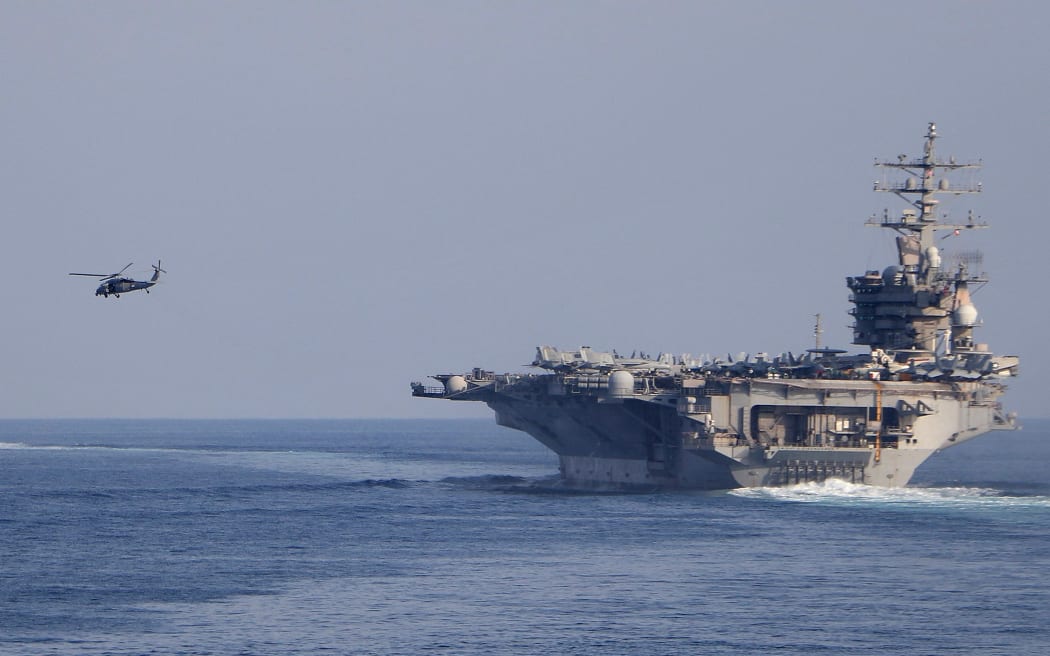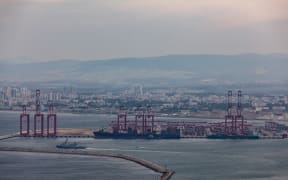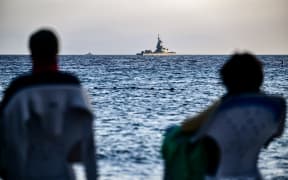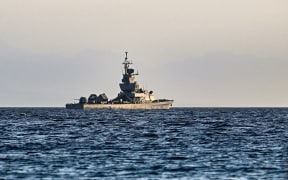By David Gritten for BBC News

The aircraft carrier USS Dwight D Eisenhower which is deployed to the Red Sea at present was among the vessels involved in the operation. Photo: AFP / US Department of Defence / US Navy
UK and US naval forces have repelled the largest attack yet by Yemen's Houthi rebels on Red Sea shipping, UK Defence Secretary Grant Shapps says.
Carrier-based jets and warships shot down 21 drones and missiles launched by the Iran-backed group overnight.
The Houthis said they targeted a US ship in retaliation for the killing of rebels who tried to attack a container ship by using speed boats last month.
Shapps said he had "no doubt" that Iran was heavily behind such attacks.
Asked about possible Western strikes on Houthi targets in Yemen in response, he said: "Watch this space."
The Houthis have carried out 26 attacks on commercial shipping in the Red Sea since 19 November, according to the US military.
The group has claimed - often falsely - that it is targeting ships linked to Tel Aviv in protest at Israeli actions during the war in the Gaza Strip.
The US military said Iranian-designed one-way attack drones, anti-ship cruise missiles and anti-ship ballistic missiles were launched from Houthi-controlled areas of Yemen towards international shipping lanes in the southern Red Sea at around 21.15 local time (18.15 GMT) on Tuesday.
Eighteen drones, two cruise missiles and one ballistic missile were shot down by F/A-18 warplanes from the aircraft carrier USS Dwight D Eisenhower, which is deployed in the Red Sea, and by four destroyers, the USS Gravely, USS Laboon, USS Mason and HMS Diamond.
HMS Diamond shot down seven Houthi drones using its Sea Viper missiles and guns, a defence source told the BBC. Each of the missiles costs more than £1 million ($NZ2.04m).
No injuries or damage were reported.
Later, Houthi military spokesman Yahya al-Sarea confirmed that its forces had carried out an operation involving "a large number of ballistic and naval missiles and drones".
"It targeted a US ship that was providing support for the Zionist entity [Israel]," he said.
"The operation came as an initial response to the treacherous assault on our naval forces by the US enemy forces."
He added that the rebels would "not hesitate to adequately deal with all hostile threats as part of the legitimate right to defend our country, people and nation".
Sarea also reiterated that the Houthis would continue to "prevent Israeli ships or ships heading towards occupied Palestine from navigating in both the Red Sea and the Arabian Sea until the [Israeli] aggression [on Gaza] has come to an end and the blockade has been lifted".
Shapps warns of further consequences
Shapps warned in a statement on Wednesday morning that the UK and its allies had "previously made clear that these illegal attacks are completely unacceptable and if continued the Houthis will bear the consequences".
"We will take the action needed to protect innocent lives and the global economy," he added.
Later, the defence secretary said in a TV interview that Iran was "behind so much of the bad things happening in the region" and warned the Islamic Republic and the Houthis that there would be "consequences" if the attacks on shipping did not stop.
Asked if there could be Western military action against Houthi targets in Yemen, or even targets inside Iran, he replied: "I can't go into details but can say the joint statement we issued set out a very clear path that if this doesn't stop then action will be taken. So, I'm afraid the simplest thing to say [is] 'watch this space'."
He was referring to a statement put out a week ago by the UK, US, Australia, Bahrain, Belgium, Canada, Denmark, Germany, Italy, Japan, Netherlands, New Zealand, South Korea and Singapore, who launched Operation Prosperity Guardian last month to protect Red Sea shipping.
They said the attacks posed "a direct threat to the freedom of navigation that serves as the bedrock of global trade in one of the world's most critical waterways".
Almost 15 percent of global seaborne trade passes through the Red Sea, which is linked to the Mediterranean by the Suez canal and is the shortest shipping route between Europe and Asia.
The fear is that fuel prices will rise and supply chains will be damaged.
The International Chamber of Shipping says 20 percent of the world's container ships are now avoiding the Red Sea and using the much longer route around the southern tip of Africa instead.
The Houthis say they have been targeting Israeli-owned or Israel-bound vessels to show their support for the Iran-backed Palestinian group Hamas since the start of the war in Gaza in October.
Formally known as the Ansar Allah (Partisans of God), the Houthis began as a movement that championed Yemen's Zaidi Shia Muslim minority.
In 2014, they took control of the capital, Sanaa, and seized large parts of western Yemen the following year, prompting a Saudi-led coalition to intervene in support of the international-recognised Yemeni government.
The ensuing war has reportedly killed more than 150,000 people and left 21 million others in need of humanitarian assistance.
Saudi Arabia and the US have accused Iran of smuggling weapons, including drones and cruise and ballistic missiles, to the Houthis, in violation of a UN arms embargo. Iran has denied the allegation.
This story was first published by the BBC.







